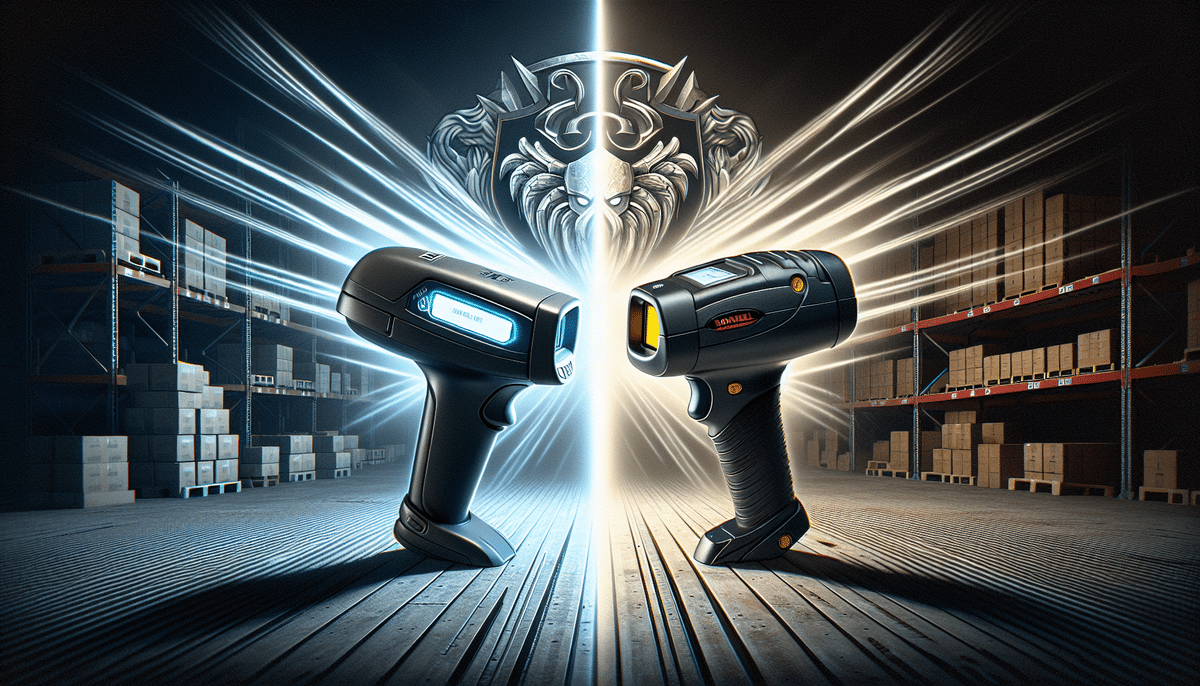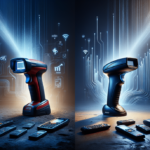Zebra DS8178 vs Honeywell Granit 1911i: Comprehensive Barcode Scanner Comparison
If you're in the market for a barcode scanner, you've likely come across two leading options: the Zebra DS8178 and the Honeywell Granit 1911i. Both scanners offer exceptional scanning capabilities and robust features tailored for industrial environments. This article provides an in-depth comparison to help you make an informed decision based on your specific business needs.
Overview of Zebra DS8178 and Honeywell Granit 1911i
The Zebra DS8178 and the Honeywell Granit 1911i are high-performance, handheld scanners designed for demanding industrial settings. Ideal for use in warehouses, distribution centers, and similar environments, both models boast features like Bluetooth connectivity, extensive battery life, and intuitive user interfaces.
However, they have distinct differences. The DS8178 offers a higher scanning speed and can read barcodes from greater distances, making it suitable for large-scale operations. In contrast, the Granit 1911i is built with a more rugged design, capable of withstanding extreme temperatures and exposure to chemicals, making it ideal for harsher working conditions. Your choice between these two should align with your operational requirements and environmental conditions.
Design and Ergonomics
Zebra DS8178 Design
The Zebra DS8178 features a sleek and lightweight design, promoting comfort during extended use and reducing operator fatigue. Its high-performance scanning engine ensures quick and accurate barcode reading, even on damaged or poorly printed labels.
Honeywell Granit 1911i Design
The Honeywell Granit 1911i boasts a bulkier, more rugged design. It can endure multiple drops from heights of up to 6 feet and withstand extreme temperatures ranging from -30°C to 50°C. The Granit 1911i also includes a pistol grip, providing a secure hold even when gloves are worn, and offers tactile feedback through vibration upon successful scans, minimizing the need for visual confirmation.
Comparison
- Zebra DS8178: Lightweight, comfortable grip, high scanning speed.
- Honeywell Granit 1911i: Rugged build, durable exterior, vibration feedback.
Scanning Performance
Zebra DS8178 Performance
The Zebra DS8178 excels with its omnidirectional scanning capabilities, allowing it to capture barcodes swiftly from any angle and on various surfaces, including curved and shiny ones. According to [Zebra Technologies](https://www.zebra.com/us/en/products/scanners.html), the DS8178 can scan up to 60 scans per second, making it highly effective in environments with high scanning volumes and diverse barcode orientations.
Honeywell Granit 1911i Performance
Conversely, the Honeywell Granit 1911i offers reliable scanning performance in challenging conditions, such as low-light environments or areas with significant dust and moisture. Its long-range scanning capability, up to 30 feet, is particularly beneficial in large warehouses where scanning from a distance enhances efficiency.
Performance Comparison
Choosing between them depends on your specific operational demands:
- If you operate in a retail environment with high scanning diversity, the Zebra DS8178 is more suitable.
- If your operations are in rugged or low-light settings, the Honeywell Granit 1911i is the better choice.
Connectivity Features
Both scanners offer Bluetooth connectivity, enabling seamless pairing with devices like tablets, smartphones, and computer systems. The Zebra DS8178 enhances this with Wi-Fi connectivity, allowing for remote device management and straightforward firmware updates.
Additionally, the DS8178 supports NFC (Near Field Communication), facilitating quick pairing with NFC-enabled devices through simple tapping. In contrast, the Honeywell Granit 1911i features Bluetooth Class 2 connectivity with a range of up to 10 meters, making it ideal for small to medium-sized workspaces but potentially limiting in larger environments.
Battery Life
Battery longevity is crucial for continuous operations. The Zebra DS8178 offers up to 15 hours of continuous use on a single charge, while the Honeywell Granit 1911i provides up to 14 hours. Both models support quick charging, allowing for a full recharge in a minimal timeframe.
Factors such as ambient temperature and usage intensity can affect battery performance. The DS8178 utilizes a lithium-ion battery, known for its long lifespan and rapid charging. In contrast, the Granit 1911i employs a nickel-metal hydride battery, which, while more affordable to replace, may not last as long under heavy use.
Durability and Build Quality
When it comes to durability, the Honeywell Granit 1911i outperforms the Zebra DS8178. It boasts an IP65 rating, ensuring resistance to dust and water, and is engineered to withstand multiple drops from 6 feet. Additionally, its ability to operate in extreme temperatures makes it suitable for the harshest industrial environments.
While the Zebra DS8178 is built to be durable, it doesn't match the Granit 1911i's level of ruggedness, particularly in extreme conditions. Businesses operating in environments with high exposure to harsh elements will find the Granit 1911i to be a more resilient choice.
User Interface and Experience
The user experience is vital for operational efficiency. The Zebra DS8178 features a user-friendly interface with a color display and intuitive touch controls, allowing for easy navigation and customization. It also offers multiple language options, catering to diverse workforces.
In contrast, the Honeywell Granit 1911i has a simpler interface, optimized for low-visibility conditions. Its durable design ensures functionality even in environments where visibility is compromised, making it ideal for use in bright or dark industrial settings.
Price and Value
Both scanners are priced competitively, with the Honeywell Granit 1911i typically being slightly more affordable. This makes it an attractive option for businesses with budget constraints without compromising on essential features like durability and reliable scanning performance.
On the other hand, the Zebra DS8178 may represent a higher investment, but it offers advanced features such as omnidirectional scanning and NFC connectivity, which can enhance operational efficiency in environments with high scanning demands.
Pros and Cons
Pros and Cons of Zebra DS8178
Pros:
- Omnidirectional scanning capabilities for versatile barcode capture
- Wi-Fi and NFC connectivity for enhanced device management
- Sleek, lightweight design ensures user comfort during extended use
Cons:
- Less rugged compared to the Honeywell Granit 1911i, potentially unsuitable for extremely harsh environments
- May struggle in low-light conditions
Additional Information:
The Zebra DS8178 offers a scanning range of up to 24 inches, facilitating easy scanning of items on high shelves or in hard-to-reach areas. Its ability to read damaged or poorly printed barcodes reduces the need for manual data entry, enhancing workplace efficiency.
Pros and Cons of Honeywell Granit 1911i
Pros:
- Highly durable construction withstands drops and exposure to harsh elements
- Reliable scanning performance in low-light and rugged environments
- More affordable than the Zebra DS8178
Cons:
- Bulkier design may cause discomfort during prolonged use
- Lacks omnidirectional scanning capabilities
Additional Information:
The Honeywell Granit 1911i's long-range scanning capability makes it ideal for large-scale operations, allowing workers to scan barcodes from a distance and increasing overall efficiency. Its robustness ensures consistent performance even when scanning barcodes that are damaged or not perfectly printed.
Customer Reviews and Ratings
Customer Reviews and Ratings of Zebra DS8178
Customers consistently praise the Zebra DS8178 for its reliable and versatile scanning performance. Users highlight its exceptional omnidirectional scanning capabilities and user-friendly interface as major benefits. However, some reviews note that the scanner may not perform optimally in low-light conditions and that its durability is slightly less robust compared to other industrial scanners.
Customer Reviews and Ratings of Honeywell Granit 1911i
The Honeywell Granit 1911i receives positive feedback for its outstanding durability and dependable scanning performance, particularly in challenging environments. Users appreciate its ability to function reliably in low-light settings and its rugged build quality. Some reviews mention minor concerns regarding battery life and charging times, but overall satisfaction remains high.
Conclusion: Which Barcode Scanner Should You Choose?
The decision between the Zebra DS8178 and the Honeywell Granit 1911i hinges on your business's specific needs:
- Choose the Zebra DS8178 if you require a lightweight, versatile scanner with superior omnidirectional scanning capabilities, ideal for high-volume and diverse scanning environments.
- Opt for the Honeywell Granit 1911i if your operations are in rugged or low-light settings where durability and reliable performance in harsh conditions are paramount.
Additionally, consider your connectivity requirements. If your business relies heavily on seamless integration with multiple devices and remote management, the DS8178's Wi-Fi and NFC capabilities may offer significant advantages.
Regardless of your choice, both the Zebra DS8178 and Honeywell Granit 1911i are exceptional barcode scanners that offer substantial value, enhancing efficiency and reliability in your business operations.






















